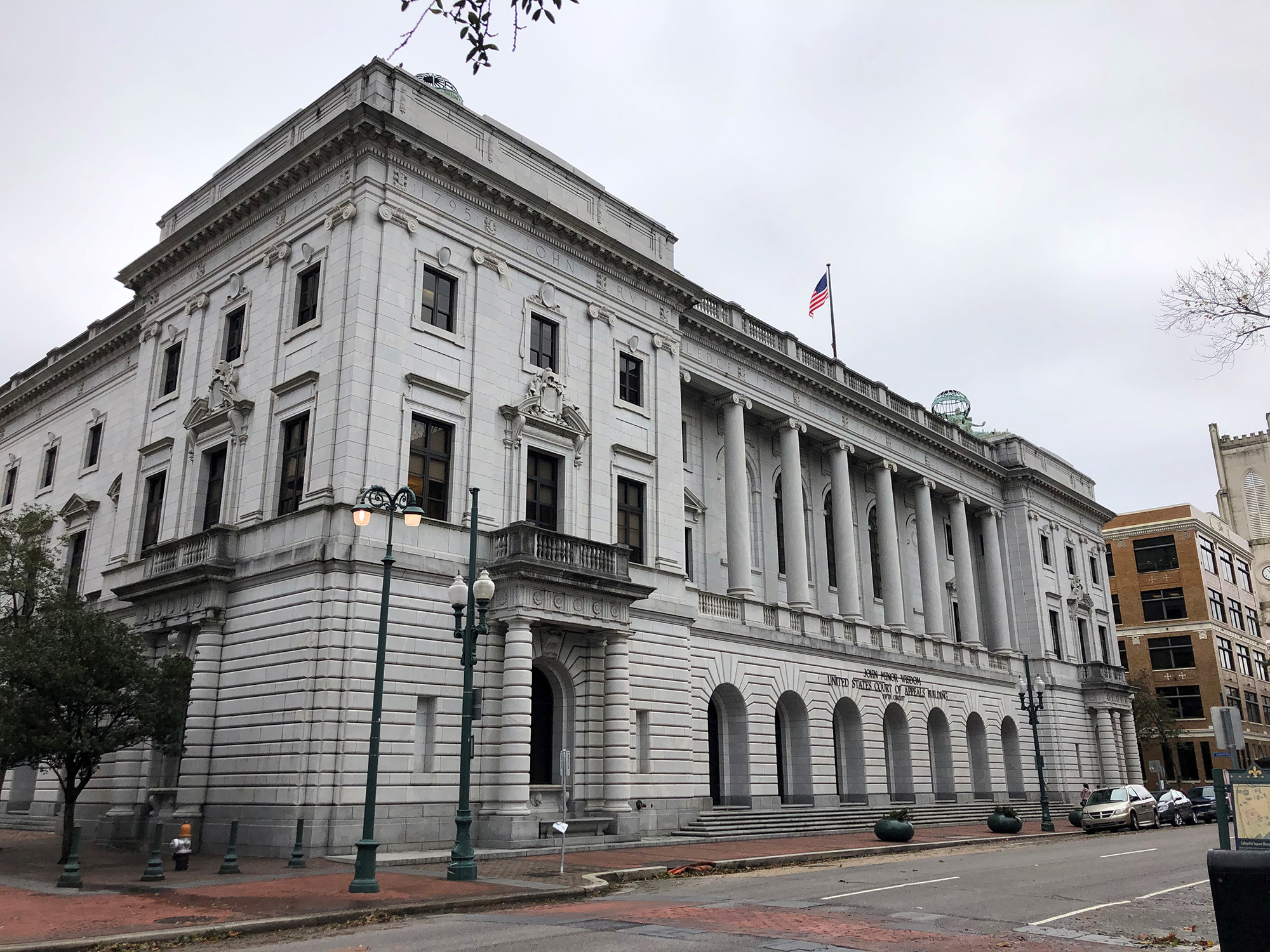
NEW ORLEANS (BP) — The 5th U.S. Circuit Court of Appeals heard oral arguments Thursday over a lower court’s dismissal of a lawsuit against the North American Mission Board by a former executive of the Baptist Convention of Maryland/Delaware (BCMD).
 The three-judge panel sharply questioned both sides as to whether and how First Amendment legal precedent protecting churches and religious organizations from state interference applied to the case.
The three-judge panel sharply questioned both sides as to whether and how First Amendment legal precedent protecting churches and religious organizations from state interference applied to the case.
Will McRaney, the BCMD’s former executive director, filed a lawsuit in 2017 alleging NAMB had intentionally defamed and wrongly influenced his 2015 termination by the BCMD after a dispute over collaborative missions efforts in the region. The suit also claimed NAMB had prevented or attempted to prevent him from speaking at conferences after his departure from the BCMD, and that he suffered emotional distress when his photo was displayed in the reception area of NAMB’s offices in Alpharetta, Ga.
Except to acknowledge the photo had been posted in the reception area of its headquarters, NAMB has consistently denied McRaney’s claims.
Last April, Senior Judge Glen Davidson of the U.S. District Court Northern District of Mississippi dismissed the lawsuit, ruling the court could not consider McRaney’s claims because of the ecclesiastical abstention doctrine, which prevents the government from interfering in church or religious matters. But McRaney’s counsel argued Thursday that the ecclesiastical abstention doctrine did not apply.
“NAMB is not a church,” attorney Harvey Barton argued. “They are an entity that controls money…. This is a dispute about power and money. It’s not about church doctrine. It’s about who gets to be in control.”
Representing NAMB, attorney Donna Jacobs of the firm Butler Snow argued that both sides agreed the initial conflict was over missions strategy. Jacobs said McRaney’s acknowledgment of that in his claims showed the dispute was “inherently religious.”
McRaney was the BCMD’s executive director from 2013 until he was terminated in June 2015. He filed suit in April 2017, after more than a year of online postings alleging various wrongdoing by NAMB and its president Kevin Ezell — including the claim, made in the lawsuit, that NAMB threatened to withhold money and to end a strategic partnership agreement for evangelism and church planting “unless McRaney was terminated.”
 NAMB has consistently denied that claim, along with others. Its response to McRaney’s lawsuit claimed the BCMD had become “a dysfunctional and difficult ministry partner” while he was its executive director.
NAMB has consistently denied that claim, along with others. Its response to McRaney’s lawsuit claimed the BCMD had become “a dysfunctional and difficult ministry partner” while he was its executive director.
Barton, McRaney’s counsel, argued Thursday that McRaney had opposed NAMB’s desire for a new strategic partnership agreement with BCMD because it would have lessened BCMD’s autonomy.
After the hearing, McRaney told Baptist Press he “regret(ted) having to be here, but I certainly am glad for the opportunity to defend the historic Southern Baptist position.”
Jacobs told the judges that NAMB had never claimed to have any authority or hierarchical control over the BCMD. She agreed with Barton that the Southern Baptist Convention and its various entities and state conventions are autonomous rather than a top-down hierarchy like some other religious denominations, characterizing NAMB’s relationships and agreements with BCMD and other state conventions as “cooperative.”
When questioned by the judges about the SBC’s autonomous organizational structure, Jacobs argued that the differences from other denominations should not afford the SBC and its entities “lesser protection” from government interference in their religious affairs.
Jacobs also argued that McRaney’s claims that the dispute was over missions strategy showed the case concerned religious matters.
In a statement released after the hearing, George McCallum, NAMB’s legal counsel, reiterated Jacobs’ argument.
“NAMB has never asserted — through its defenses in this lawsuit or otherwise — that it has authority or ‘hierarchical’ control over any SBC church, association, convention, or other entity. NAMB firmly believes in and supports autonomy and congregational cooperation in the SBC, which is grounded in our theology.”
McCallum attended the hearing along with Mark Dyer, former chair of NAMB’s board of trustees. Dyer, an attorney, is no longer a trustee but continues to chair a litigation committee of the board. Mike Ebert, NAMB’s executive director for public relations, also attended.
“We are pleased with how today’s oral argument went,” McCallum told Baptist Press after the hearing. “Our attorney affirmed the long-standing principle of autonomy within Southern Baptist life and made a strong case for religious liberty. We look forward to the Court’s ruling.”
There’s no certain timeline for a decision. If the lower court’s decision is upheld, McRaney could petition the U.S. Supreme Court, which takes up only a few of the approximately 10,000 petitions it receives annually. If McRaney wins the appeal, the case would be remanded to U.S. District Court.
McRaney attended the hearing along with his wife, Sandy McRaney.
“I can prove my claims,” McRaney told Baptist Press after Thursday’s hearing, “but I have to get to that point.”
In a statement released after the hearing, McCallum said: “NAMB has consistently denied McRaney’s allegations and will continue its vigorous defense in the appropriate forum.”
The Baptist Convention of Maryland/Delaware (also known as the Mid-Atlantic Baptist Network) has also disputed McRaney’s claims, writing in March 2016 that “any suggestion that the North American Mission Board (NAMB) or any of its officers influenced the separation of Dr. McRaney’s employment from the Network is false.”
In NAMB’s statement, Danny Wood, chair of NAMB’s Board of Trustees, said: “The NAMB Board of Trustees has been fully engaged and informed by appropriate advisors throughout this situation. Board representatives have met with Dr. McRaney to seek resolution, and we continue praying for him. Our primary objective is to honor Christ in our restraint and response to Dr. McRaney’s claims.”
Judges spent several minutes of both parties’ allotted 20 minutes for argument with questions about the photograph of McRaney, which was posted in 2015 at NAMB’s offices in Alpharetta, Ga. In court filings, McRaney claimed the photo caused emotional distress because it “communicates that (McRaney) was not to be trusted and public enemy #1 of NAMB.”
According to court filings, NAMB does not dispute the photograph “was situated in the reception area at NAMB’s offices in Alpharetta during some period of time,” but adds: “All remaining allegations denied.”
But the Fifth Circuit’s decision will hinge on whether it determines a secular court has standing. In dismissing the case last April, Davidson wrote that neither the U.S. District Court Northern District of Mississippi nor any other court had jurisdiction because of the ecclesiastical abstention doctrine.
“Review of these claims will require the Court to determine why the BCMD fired McRaney — whether it was for a secular or religious purpose,” Davidson wrote in the dismissal. “It will require the Court to determine whether the NAMB’s actions were done with ‘without right or justifiable cause’ — in other words, whether the NAMB had a valid religious reason for its actions. That the Court cannot do.”
On Thursday, the 5th Circuit judges questioned whether they could determine if religious elements were involved without knowing the facts of the case. Several times, they asked whether “doctrinal” issues were involved.
Representing NAMB, Jacobs argued that delving into the facts would necessarily require an unconstitutional intrusion into religious matters, and added that the admission by both parties that the initial dispute between McRaney and NAMB was about missions strategy meant, “We know what we need to know.”
In NAMB’s statement, McCallum reiterated the entity’s position: “The district court correctly dismissed Will McRaney’s lawsuit because the secular courts may not interfere with the internal affairs of religious ministries. The First Amendment affords religious freedom for all churches and ministries, and an appellate decision upholding the dismissal of this lawsuit would further these well-founded constitutional protections.”












